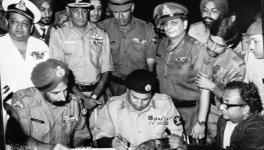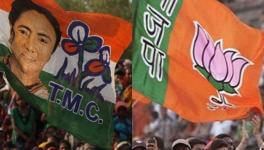Rightwing-Rightwing ‘Bhai Bhai: Who Fears Javed Akhtar?
Image Courtesy: Wikimedia Commons
"The devout man considers me an infidel, and the infidel thinks, (I'm) Muslim/
the non-believer thinks I'm saint, and the saint considers me non-believer/
After hearing both sides, I am amazed/
I'm that subject which is difficult to understand/
If someone is inclined to understand, then I am easy."
[https://www.editorji.com/entertainment-news/javed-akhtars-couplet-cause…]
There are rare occasions when literary academies associated with governments wilt under mob pressure.
Rarer are occasions when they even cancel the very programme they had organised with much fanfare.
It has been more than 10 days that West Bengal witnessed such a spectacle, when the West Bengal Urdu Academy suddenly postponed a programme where it intended to discuss 'Urdu in Indian Cinema' for four consecutive. Javed Akhtar -- one of the foremost living Urdu poets -- was also invited as a key speaker in the programme.
Two prominent Islamist organisations in Kolkata, Jamiat Ulema-e-Hind and the Wahyahin Foundation, had protested the invitation, as they considered Akhtar’s views on religion problematic, labelling him as someone who "speaks against religion and God".
Akhtar is a declared atheist and openly talks about it on public fora, and that had irked these people.
The organisations even threatened to launch a state wide agitation -- much on the lines of their agitation against Bangladeshi author Taslima Nasreen which as everyone knows had forced her to leave the state (2007) -- if the government did not heed their demand.
Mamata Banerjee, the West Bengal Chief Minister, did not want to take any risk as elections to the state Assembly are not too far.
Outrage Unlimited?
This sudden postponement/cancellation of the programme did create a sense of outrage among writers, activists and personalities associated with cultural arena. Concerned citizens condemned the 'shameful' act, and questioned the 'idiots' who run the Urdu Academy, people “who do even not know the genesis of this language or who are keen to conflate Urdu with Muslim identity.” This weaponisation of 'hurt sentiments' to shape political choice also came under scanner of analysts.
No doubt, the discernible outcome of this whole spectacle is the way it brought to the fore the voices of these self-proclaimed custodians of religion and morality to the centrestage, exposed their myopic worldview and demonstrated how they appear to be a mirror image of similar custodians from the other side, who similarly target the likes of comedians Kunal Kamra or Munawar Faruqui to folk singer Neha Rathod or the academic ‘Medusa’ etc., as they consider their views and the courage and the irreverence with which they carry it, objectionable.
No doubt this postponement/effective cancellation of Akhtar's Kolkata programme, must have gladdened Hindutva Supremacists to no end.
For them, too, Akhtar is no friend of Hindutva and has time and again criticised, condemned their efforts to usher India into Hindu Rashtra, abandoning the glorious history of this secular republic
Birds of Same Feather?
Like the old idiom goes, ‘birds of the same feather flock together’, one witnesses a similar tango of sorts among religious supremacists -- despite their apparent opposition to one another -- on various occasions.
Such 'unity of purpose' is witnessed especially when the State moves draft laws that refuse to give primacy to one's faith. All such steps that essentially promote separation of religion from politics are anathema to them. As they consider themselves to be the sole spokespersons of 'their community', they are always in the forefront of raising objections.
Look at the debate around 'law against blasphemy which the Punjab government wants to introduce. As we know the proposed Punjab Prevention of Offences against Holy Scriptures Bill, 2025 (PPOHS Act), was recently referred by the state legislature to a committee for further discussion.
We should not forget that it was in 2015 when a coalition government led by Akali Dal and Bharatiya Janata Party dominated, with their worldview associated with a particular religion. They had pioneered the move to make a 'stringent law' against blasphemy.
Whereas experts on the Constitution or people/formations keen to uphold the secular nature of our Constitution, have vehemently opposed such moves -- 'like the blasphemy law', neither the Hindutva Right nor the Muslim Right deemed it necessary to protest this move.
All the secular critique of this law, like how instead of making the State more distant from religion, it would “further consolidate the hold of sectarianism, and strengthen the hands of religious extremists on all sides”, appears music to their ears.
Similarly, misuse of the words “against minorities and weaker sections, to harass them, exact revenge and also to settle personal and professional quarrels, all matters entirely unrelated to blasphemy” does not appear jarring to them.
Perhaps, we can as well recall the 2013 judgement of the Supreme Court -- which had essentially upturned a highly progressive judgement of the Delhi High Court, then led by Justice A P Shah-- which had decriminalised homosexuality and how during the interim period Rightwingers, conservatives of various shades -- from saffron to green -- had joined hands to oppose this progressive judgement
Later, when the Supreme Court re-criminalised homosexuality, many a self-proclaimed leaders of religion and purveyors of morality had felt vindicated and even held a press conference proclaiming their support to the decision of the Supreme Court on Section 377 of the Indian Penal Code, as it was' [n]ot only in line with the eastern traditions of this country, moral values and religious teachings but it also removes apprehensions about invasion of Western culture and disintegration of the family system and fabric of social life—the inevitable fallouts of the Delhi High Court order of 2009 wherein it decriminalised homosexuality' .
The bonhomie exhibited by the holy men of different faiths was for everyone to see.
One wonders whether they ever exhibited similar eagerness to come together over any issue of real material concern for their own followers, or when hatred poured out on the streets dividing people into 'us' versus 'them' camps.
Journey Down Memory Lane
This episode reminds one of a period 80 years ago, when India was still under the yoke of the British colonial government and there was talk of enacting the Sharada Act, which prohibited marriages of girls under 14 years. Not very many people would know today that the initial impetus to enact the Act had come from the revulsion felt by the articulate sections over the death of Phulmoni, a child bride who had died after her marriage to a man much older than her, was consummated. The 'pious' and the ‘holy of both faiths', namely, Hindu and Muslim, had then come together to declare that they would not allow this 'outrage on their deepest convictions and their most cherished rights'.
It would be opportune here to recall Jawaharlal Nehru writing on the subject that had appeared in Modern Review (December 1935).
'Some years ago I happened to be in Benaras... We saw Brahmins.. marching shoulder to shoulder with bearded Moulavies.. and one of the standards they carried in triumph bore the flaming device â ˜Hindu-Muslim ekta ki jai (Victory to Hindu-Muslim unity).. This was a joint protest by the orthodox of both religions against the Sarada Act.
He adds:
'Offensive slogans were hurled at us and there was some jostling about. Just then, the procession arrived at the Town Hall and, for some reason or other, started stone throwing. A bright young person thereupon pulled some crackers and this had an extraordinary effect on the serried ranks of the orthodox. Evidently thinking that the police or the military had opened fire, they dispersed and managed (this) with extraordinary rapidity. A few crackers were enough to put the procession to flight…
[ Quoted in Social and Religious Reform, Amiya P. Sen, OUP, page 118]
Nehru also notes the reluctance of the Western educated liberals to support the venture and how they viewed the issue of social reform. In this context, he quotes Sir Muhammad Iqbal, a leader of the solidarity of Islam, who was in cordial agreement with the orthodox Hindus:
'I very much appreciate the orthodox Hindus demand for protection against social reformers in the new constitution. Indeed, this demand ought to have been first made by the Muslims.'(Ibid.)
The writer is a senior independent journalist. The views are personal.
Get the latest reports & analysis with people's perspective on Protests, movements & deep analytical videos, discussions of the current affairs in your Telegram app. Subscribe to NewsClick's Telegram channel & get Real-Time updates on stories, as they get published on our website.























